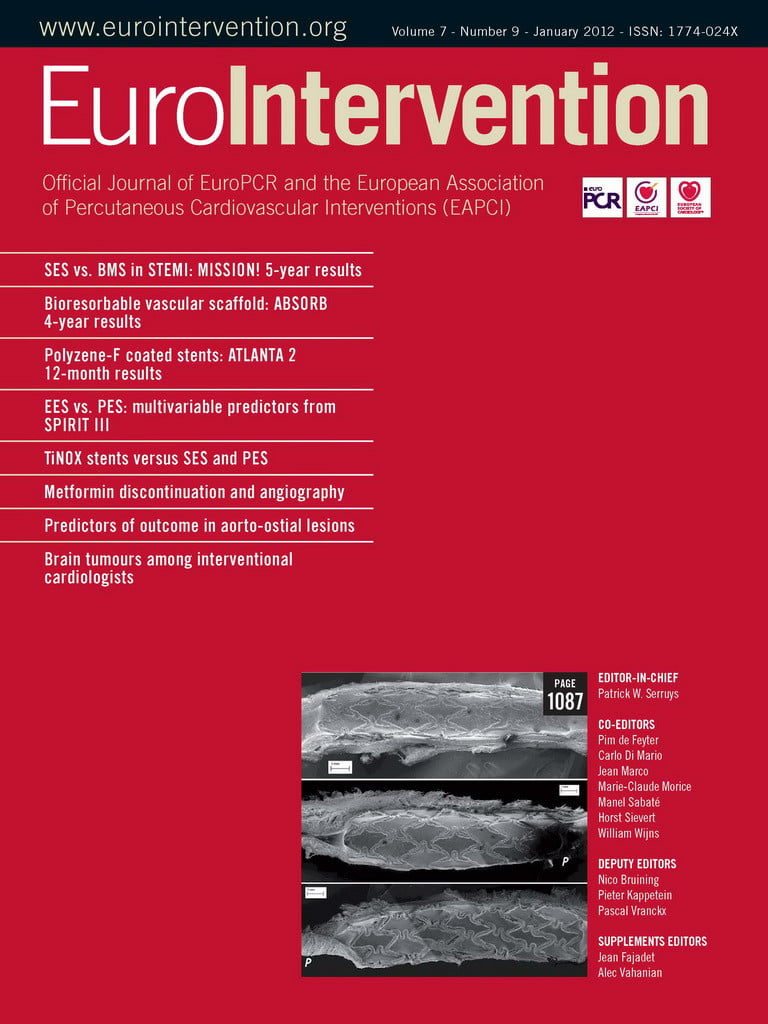Dear colleagues,
While we see all around us an ever increasing growth of global relationships in ideas, languages, popular culture and economic activity, paradoxically we notice the trend within our own interventional community to diversify. Our arena has become more specialised, with international experts devoting themselves to very specific areas such as CTO’s, bifurcations, TAVI, renal denervation and so forth. We are not surprised by this as we have seen in the past asimilar development of diversification within the internal medicine field.
This diversification within our field has led the PCR Board to announce an innovative project, the PCR Focus Group, that will look in depth at select, early-phase technologies, translating what they are and pinpointing how they might be practically applied for use by our interventional community.
The primary objective of PCR Focus Group is to ensure that the current diversification should not lead to small, and uncritically considered, dislocated meetings. By embracing globalisation, the PCR Focus Group will act as the “glue” for the various early stage technologies, keeping things in proper scrutiny, helping them to mature either towards a clinical standard-of-care, and into the PCR mainstream or to remain super specialised technologies with a “transient” character (a small audience but with a limited lifecycle). The PCR Focus Group is a “think tank” that will “focus” several times during the year on emerging trends, reflecting –in detail– on their “possible clinical applications, related technical developments and… relevant research programmes”, and then offering dedicated meetings at different locations on the fruit of these reflections.
As you know, I have been involved for many years in tracking, commenting and using the technologies that form our discipline. These have always evolved at a rapid pace, and the need to understand and direct their development is elusive. We continue our work, we treat our patients, and at the same time, we try to learn about the latest cutting edge innovations and apply them to our practice. To do all this at once has often proven to be a juggling act that is difficult to manage.
Looking around the interventional landscape today, we see various “clubs” like the CTO or the Bifurcation Clubs, which deal with knowledge in a targeted, shall we say, “purified” fashion. Rather than permanent meetings where many issues are addressed, these groups approach knowledge in a more informal, and yet highly focused manner on specific subjects. PCR Focus groups will operate in much the same manner, but on a wider range of topics – one-by-one – in new technologies. In a more general way, we will have created the PCR Focus Group to target key issues, creating aseries of satellite programmes, and then taking the best that happens at these focus sessions, turning them into a sort of “best of” that will then be presented at the other PCR meetings.
A new think tank
After aspecific topic is chosen and studied in depth, a meeting will be organised that will explore all the various aspects of this subject. The general objectives of this PCR Focus Group meeting, willbe:
–To hold an interactive forum with scientists as well as current and possible new clinical investigators to analyse the available data related to this new technology
–To teach the specific aspects of the practical application of this technology in the clinical arena and examine the possible added value that this technology offers us for our practice
–To identify potential areas of clinical application that require further research
–To prepare a comprehensive summary of the technology as the foundation for “glimpse into the future” sessions at other PCR courses
PCR FOCUS on Bioresorbable Vascular Scaffolds
We have already focused on one topic that I find of special importance, and which will form the basis of our first session. On March 8-9, 2012, in The Netherlands on the SS Rotterdam, (yes, this was the former cruise ship) 150 to 200 participants will come together to participate in the PCR Focus Group on Bioresorbable Vascular Scaffolds (BVS). Led by a distinguished international group of KOL’s, clinicians, experimental experts and regulatory officials we will explore all the aspects of this emerging technology, providing:
–An overview on current data available on the new bioresorbable vascular scaffolds
–insights on how bioresorbable vascular scaffolds are different from the currently available metallic stents
–an overview on new imaging techniques that enables improvement of implantation techniques with bioresorbable vascular scaffolds
–a debate on applications of this new technology
The local programme directors will by myself, Pieter Smits, Robert-Jan van Geuns and Felix Zijlstra. We look forward to seeing you there, or at any of the other PCR Focus Group sessions that will take place throughout Europe over the next few years.
Turning the table
As we begin this year, we want to point out a sobering article that appears in this current issue of EuroIntervention. Often on these pages we deal with our clinical capacity to treat patients, here in the article by Ariel Roguin et al, the tables are indeed turned, and it us, the physicians that become the patients. In “Brain tumours among interventional cardiologists: a cause for alarm?” the authors examine four new cases of brain tumours seen among our colleagues and review the current literature on this subject. At the end of the article they call on all our readers to submit their own experiences on this subject, and we heartily approve of this initiative. We have published similar articles before, and it is a sobering but important aspect of what we do that we keep ourselves as informed –and healthy– as possible in order to continue to offer the best for our patients and ourselves in over not only this New Year, but for many more years in the future as well.

